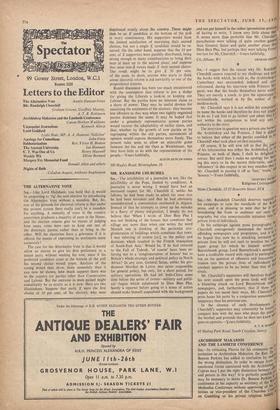Letters to the Editor
The Alternative Vote Austin Duncan-Jones Sir. Randolph Churchill
Graham Greene, Geoffrey Murray,
A. T. R. Robinson Archbishop Makarios and the Lambeth Conference Canon Herbert Waddams Unpopular Journalism Kenneth Allsop Lord Goddard Leslie Hale, MP, A. A. Dumont, 'Solicitor' Apology for Comedians John Irwin Sabbatarianism Rev. Victor H. Beaton The Ancient University Ian Hamnett C. T. Was One of Us Henry Maxwell
Weekly Wit Oliver Bernard Margery Fry Memorial Fund
Donald Allen and others Nights of Bath Celadon August, Anthony Stephenson THE ALTERNATIVE VOTE
SIR,—Like Lord Hailsham, you hold that it would be unsporting to 'rig' the next election by introducing the Alternatiye Vote without a mandate. But, Sir, one of the grounds for electoral reform is that under she present system there really can't be a mandate for anything. A minority of votes in the country sometimes produces a majority of seats in the House, and the election returns give no means of judging how many votes were cast to keep out one of the dominant parties rather than to bring in the other. Will the electorate have a grievance if it is offered the means of expressing its sentiments more accurately?
The case for the Alternative Vote is that it would allow an elector to give his first preference to a minor party without wasting his vote, since if his preferred candidate came at the bottom of the poll his second choice would count. Analysis of the voting would then show, more accurately than it can now be shown, hdw much support. there was in the country for parties other than Conservative and Labour. But the outcome in seats gained might conceivably be as erratic as it is, now. Here are two illustrations. Suppose that party X were the first choice of 10 per cent. of the elector's, who were
distributed evenly about the country. There might thin be an X candidate at the bottom of the poll in every constituency. His supporters would have the limited satisfaction of exercising their second choices, but not a single X candidate would be re- turned. On the other hand, suppose that the 10 per cent. of X supporters were patchily distributed, being strong enough in many constituencies to bring their man at least up to the second place; and suppose that most non-X voters made X their second choice. The result might be to give X 30 per cent. of the seats. In short, anyone who starts to think about electoral reform is led inevitably to one of the proportional systems.
Recent discussion has been too much encumbered with the assumption that reform is just a dodge for giving the Liberals a look-in or keeping out Labour. But the parties have no inherent claim to a share of power. They may be useful devices for canalising the sentiments of the electors: they become less effective in that way when two tightly organised parties dominate the scene. It may be hoped that under a genuinely representative system parties would recover the adaptability of earlier times, and that, whether by the growth of new parties or by regrouping within the old parties, movements of opinion would express themselves more freely. The present rules seem to allow an enjoyable game between the Ins and the Outs at Westminster, but they have little to do with the representation of the people.—Yours faithfully, AUSTIN DUNCAN-JONES
105 Hagley Road, Birmingham, 16


































 Previous page
Previous page